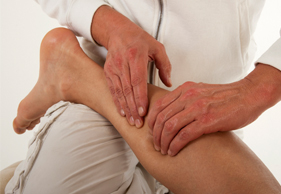From time to time I get painful calf muscles, especially in the left leg. When I pinpoint the spot and massage it, it’s incredibly painful. My physio has diagnosed them as trigger points. I’ve done some reading up on them and tried a compression approach on the trigger points myself. It helps, but the next day the pain and tightness are back in the muscle. My most recent trigger point episode lasted for about two weeks, and then just as quickly disappeared! I did not go for physio then, I treated it with massage, compression and an anti-inflammatory gel. I am wondering why I am so prone to trigger points in my calves. Does it perhaps also have something to do with some sort of nutritional deficiency, like magnesium or potassium?
I am mainly a runner, but my mileage hasn’t been that high. I trained for Half Ironman and it was the day after the race that the latest trigger point incident occurred. The bike leg was particularly tough this year with the wind and rain, and I didn’t make the bike cut-off, so the running could not have caused it! – NINA BODISCH
ANSWER
There are several things to consider when dealing with recurrent calf problems. Firstly, inflexibility of the calf muscles needs to be addressed by regular stretching of both calf muscles. Secondly, there may be a deficiency in the calf muscle strength and it would be worthwhile to adhere to a calf strengthening programme over at least six weeks. This could be achieved by simple calf raises off a step, starting with one set of 20 repetitions daily, with a straight knee, and repeated with a bent knee. These should be gradually increased to three sets of 20 of both exercises.
These are the more common causes of calf injuries and if these measures don’t eliminate the problem, I would then recommend that you have your back assessed by a physiotherapist for possible spinal or dural problems. This would possibly explain why you had a problem at 70.3 after getting off the bike, as your posture on the bike could have aggravated either a back or a dural problem, resulting in calf pain and trigger points. Finally, it has also been suggested that a vitamin B deficiency could play some part in the occurrence of trigger points.
xxx Modern Athlete Expert
TONI HESP
Physiotherapist in Edenvale, Johannesburg. Has finished 21 Comrades, four Ironmans and two New York Marathons, plus various cycling and canoeing events.
BOX 2
(Heading) Oceans ‘Padkos’
I will be driving to Cape Town on 21 April to run the Two Oceans Ultra-marathon on 23 April. Can you help with some suggestions as to what I should pack for ‘padkos’? – CINDI POLZI, HILLCREST
ANSWER
There are a number of things to keep in mind when travelling to a big race. Firstly keep your glycogen stores topped up in your muscles and liver, and keep your fluid levels topped up, especially on a hot day. Then, to avoid any gastrointestinal upset while travelling and to avoid picking up any infections prior to the big day, I suggest you always carry bottled water and avoid drinking tap water from stops along the way. Also, pre-pack meals and snacks to avoid relying on take-aways and long gaps with nothing to eat or drink.
Suitable snacks include:
• Fresh fruit, 30g dried fruit packs, 30g nut packs
• Home-made popcorn made with minimal oil
• Low-fat muesli and cereal bars, breakfast bars and low-fat energy bars
• Cereal sachets
• Low-fat cheese sticks
• Low-fat yoghurt, low-fat drinking yoghurt and smoothies
• Sandwiches, mini rolls, mini stuffed pita’s, fruit bread, low-fat muffins, low-GI rusks
• Frozen fruit juice
• Sports drinks
• Boiled eggs
• Tuna sachets
• Baby carrots, tomatoes, etc
Modern Athlete Expert
CHRISTINE PETERS
Dietician at Sunninghill Medical Centre, Johannesburg. Member of Morningside Country Club with eight years running experience, including one Comrades finish, three ultra and two half marathon finishes in the Two Oceans Marathon.
-END-


